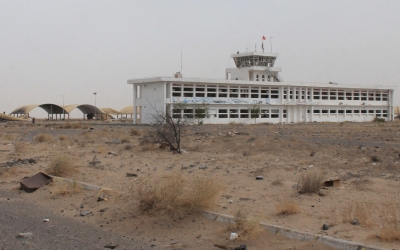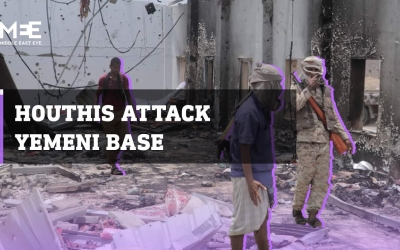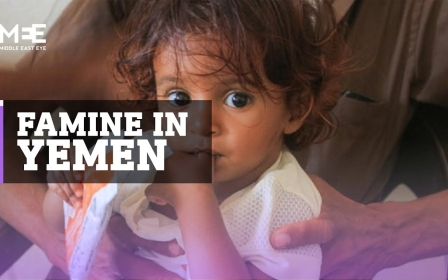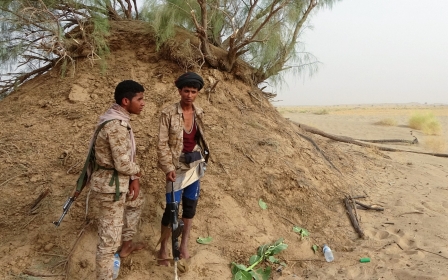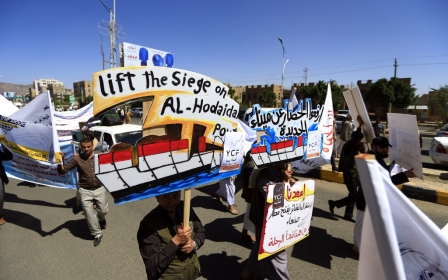Yemen: Southern separatists vow retaliation against Houthis after deadly air base bombing
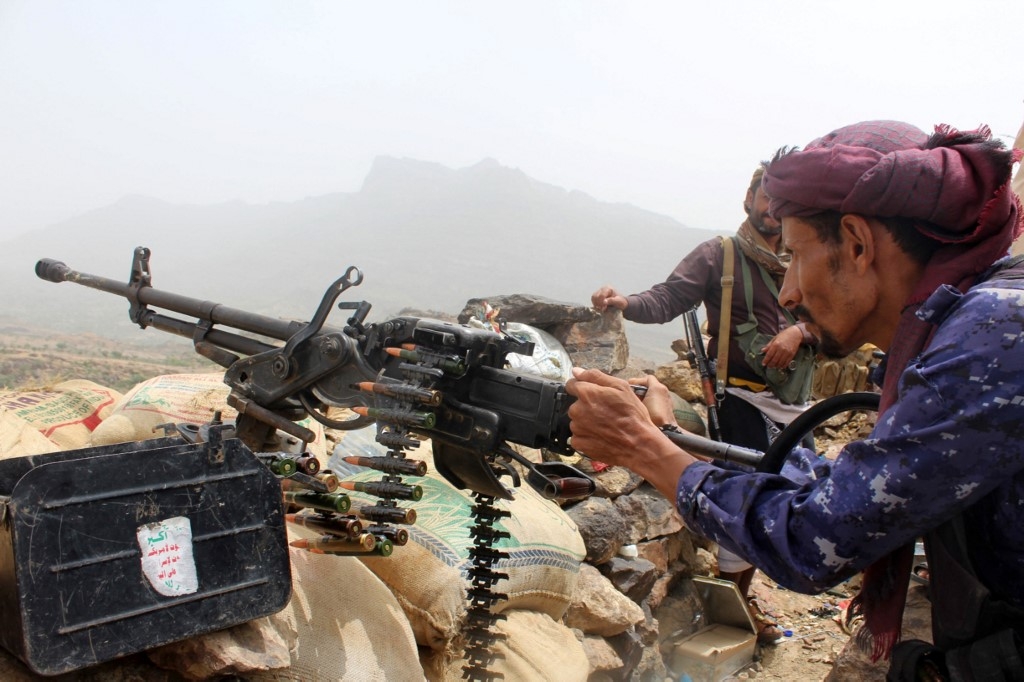
Yemen's Southern Transitional Council (STC) is preparing to strike "the deepest areas" of Houthi territory in response to a deadly attack on al-Anad air base earlier on Sunday, a spokesman for the facility has said.
While no group has claimed responsibility for the attack, which killed 30 pro-government soldiers and injured scores more, al-Anad air base spokesman Maher al-Halimi told Middle East Eye that authorities were holding the Houthi movement responsible and have vowed to strike back.
New MEE newsletter: Jerusalem Dispatch
Sign up to get the latest insights and analysis on Israel-Palestine, alongside Turkey Unpacked and other MEE newsletters
“The southern military forces backed by the Saudi-led coalition won’t stand idly by against this Houthi attack - we will reply in the deepest areas of Houthi territory,” said Halimi, adding that the air base was struck withdefe ballistic missiles from launchers positioned in the eastern area of Houthi-controlled Taiz al-Hawban.
Earlier on Sunday, Yemeni President Abd Rabbuh Mansour Hadi expressed condolences for the dead and vowed that the "Houthis will pay heavily for all the crimes they have committed against the people of Yemen".
Yemen's largest air base, al-Anad is located in Lahj province near the front lines of fighting between the STC and the Houthi movement. While most military bases near active conflict lines in Yemen were repositioned to safer areas, al-Anad has remained operational despite a number of costly attacks.
In 2019, the Houthi movement hit the air base with a drone strike that left six people dead and more than 25 injured, with high ranking officials among the casualties. Al-Anad was also the headquarters for US troops overseeing a long-running drone war against al-Qaeda until March 2014, when it was overrun by Houthi rebels.
Calls for 'a modern air defence system'
Following Sunday's attack, Colonel Mohammed al-Naqeeb, an STC spokesman, called on government forces to provide further protection for the base.
"We hope that the Saudi-led coalition provides us with modern weapons to deal with Houthi threats," Naqeeb said during a news conference.
Meanwhile, those stationed at the air base have told MEE that the position remains uniquely vulnerable to Houthi attacks.
'We hope that the Saudi-led coalition provides us with modern weapons to deal with Houthi threats'
- Colonel Mohammed al-Naqeeb, STC spokesman
One STC fighter, who asked to be referred to only as Mokhtar, said that while he received quality training at al-Anad air base, it is known to be a dangerous posting.
"I know that al-Anad is one of the largest air bases in the country and it is a good place for soldiers to receive training, but it can be targeted by the Houthi militias any time," he told MEE.
"The Houthis targeted the soldiers during the morning queue - it isn’t right for soldiers to have to gather together in such areas so close to Houthi territory," he said.
Mokhtar said that his understanding from his time being stationed at the base was that it had an air defence system providing some protections against missile or drone attacks, particularly given the fact that there are Emirati forces stationed there. But now he says that does not seem to be the case.
Who is Yemen's Southern Transitional Council?
+ Show - HideFormation
Formed in 2017, the Southern Transitional Council is a secessionist movement focused on gaining independence for South Yemen. Comprising of 26 members, the STC includes five governors from Southern Yemen and two former government ministers.
The STC emerged after Hadi fired Aden governor Aidarus al-Zoubaidi for alleged disloyalty in April 2017.
Hadi accused Zoubaidi of prioritising the Southern Yemen independence movement over a united Yemen. Following Zoubaidi's sacking, mass rallies were held in Aden to protest Hadi's move.
The STC was subsequently created a month later, with Hadi describing the council as illegitimate.
Historical background
The call for independence has been a source of contention for over a century. South Yemen's origins can be traced back to 1874 when the British Empire created the Aden colony and Aden protectorate.
Following its independence from Britain, South Yemen was formed in 1967 and later became the People's Democratic Republic of Yemen in 1970, a Soviet Union-backed Marxist-Leninist state, the only one of its kind in the Middle East during the Cold War.
The Soviet Union's collapse led South Yemen to merge with the North to form a unified Yemen. That union, however, lasted only four years and led to the 1994 civil war, when South Yemen army units accused northern president Ali Abdullah Saleh's forces of corruption.
In 2007, the Southern Movement, also known as the al-Hirak al-Janoubi, was formed. Its stated aims were to demand equality under the law and a change in relations between north and south in the context of a united Yemen.
The Hirak was met with repression by Saleh's government. This set the foreground for the Southern independence movement to flourish during the Arab Spring after the Hirak began to champion Southern independence in 2009.
Backers
In 2016, the UAE helped create the SBF in southern Yemen. The SBF included many militants who supported a secessionist movement in Southern Yemen.
Forces within the SBF supported the STC, with the aim of establishing an independent South Yemen state. Since its formation, the SBF has played a crucial role in the Saudi-led coalition before the recent escalation.
Its successes came in part due to being militarily backed by the UAE. The backing included training of SBF fighters in Abu Dhabi and the supply of military equipment.
After receiving training, the SBF was dispatched to fight Houthi forces operating inside southern Yemen.
Emirati backing was crucial in helping the STC gain Aden, which has been under its control since 2018.
"The Houthi militias are a few kilometers from the al-Anad base. There should be an air defence system there or else our leadership should remove the soldiers to other safer camps,” Mokhtar said.
“I call on the coalition to support our leadership and provide the base with a modern air defence system like the ones on the Saudi borders so that we can be protected from any of these attacks," he continued.
Earlier on Sunday, the Saudi-led coalition did confirm that its missile defence system had intercepted an overnight drone attack by Houthi rebels targeting Saudi Arabia.
'Al-Anad is still not safe'
Mahmoud, a local farmer who participated in the move to push the Houthis out of Lahj province in 2015, said that what was once a ground war is now more of an all out air battle, stressing the need for better missile defence systems across the territory.
"The whole country of Yemen, including Lahj, isn't seeing fierce clashes on the ground like before. Now it's mostly Saudi-led air strikes targeting the Houthis and the Houthis hitting their opponents with ballistic missiles or drones, so it's now more of an air war and air defence is more important than before," Mahmoud, who chose not to share his last name, told MEE.
Meanwhile, other residents of Lahj province remain concerned that the al-Anad air base could make their homes a target, Mahmoud said.
"As long as the Houthis are still in nearby Karesh, the military air base will be a pretext for the Houthis to fire more missiles on the area," said Mahmoud, who lost a finger in the 2015 battle for Lahj.
"Al-Anad is still not safe, as just today we heard the explosion in the morning and the battles are still near to us," he said. "We will only celebrate when they are pushed further south."
Middle East Eye delivers independent and unrivalled coverage and analysis of the Middle East, North Africa and beyond. To learn more about republishing this content and the associated fees, please fill out this form. More about MEE can be found here.


